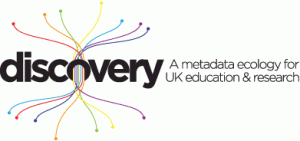ISC starts work on Discovery

Last Monday, I attended a meeting with Mimas, the co-ordinators of the JISC funded Discovery Programme in order to start planning the delivery of training for Discovery in 2012. This was my first meeting with the Discovery team, and it was really good to see a few familiar faces and also to be able to put ‘faces’ to some well known and respected ‘names’ and tweets.
I have been aware for a while of the great work that has been done by the Resource Discovery Taskforce and it is great to have the opportunity of working on the project alongside colleagues at Mimas.
The Discovery programme is based on the vision of the Resource Discovery Taskforce to make the digital resources in our museums, libraries and archives more discoverable; both by people and machines. This is being done by developing a ‘metadata ecology’ that will improve the discovery and delivery of important collections data that often lies deep within our repositories. Most of my career has been spent building these collections and I am only too aware of the importance of improving access to the resources that lie, sometimes far to hidden, deep within our websites and databases.
The discovery vision is underpinned by a set of 5 aims and 10 targets that are available from their website at: http://www.discovery.ac.uk/vision/, but more recently this has been built on by Paul Walk here at the ISC to create the Discovery Technical Principles, which will become a backbone of the efforts to ‘enhance the impact of our knowledge resources for the furtherance of scholarship and innovation.’ You can read more on this in Paul Walk’s post on the Technical Foundations blog.
The meeting started with some interesting discussion on how we might agree on a working definition of ‘identifier’ and whether this varied depending on the domain using the term and indeed whether it was even possible to provide a watertight definition of ‘entity’, that would be accepted by all domains. In the end we felt it would be better to use a more pragmatic approach and use case-studies to illustrate how different organisations have successfully tackled these issues.
The main role of the ISC within discovery is going to be helping Mimas with delivering their training program. We will be helping develop the training sessions and preparing training materials for use in the training and release through the website. Initially, this work is starting by reviewing what relevant materials are already available from within UKOLN, such as those on APIs and metadata. We will then looking wider afield to see what is available from CETIS and other sources so that we can avoid any unnecessary duplication.
The majority of these materials will be textual, but we are also going to be producing a range of multi-media resources including video and podcasts and I will be taking the lead on the production of these, and I am really looking forward to building my experience and knowledge in this area.
There are full details of the Discovery Project Training intentions on their blogsite at:
All in all, a very useful meeting and a good start to planning training with the discovery project. Lets get going!




